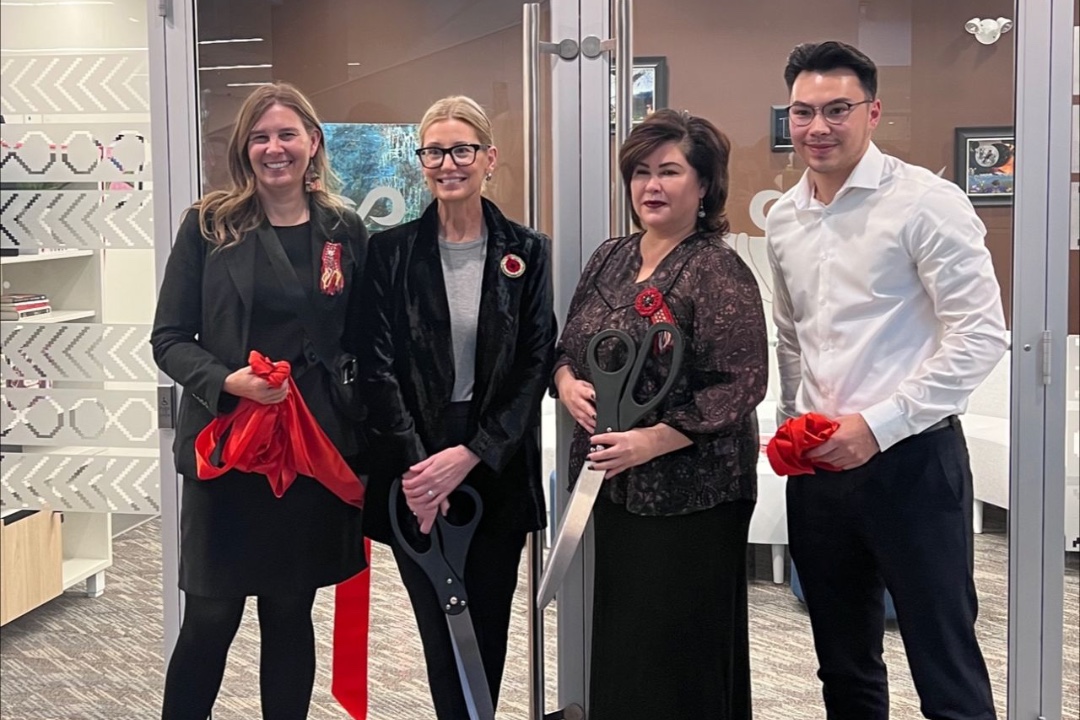NorQuest College and the Rupertsland Institute have launched Canada's first Métis student centre after students voiced concern about their culture's lack of representation.
The centre will act as a connection point for post-secondary students and the Rupertsland Institute, an affiliate of the Métis Nation of Alberta. It will offer access to the institute's advisors, who can help students with applications, emergency and technology funding, tutoring support, and more.
In addition to being the first Métis-specific student centre in Canada, students were instrumental in its creation.
"I think it's important that a student is leading this because students understand each other, especially in this generation," Skyler Wong, Métis Student Services Centre coordinator, told Taproot. "All of the ideas that we've come up with, we've thought about, 'What would we want to see if we were here?'"
Wong identifies as Métis and has been involved with the Rupertsland Institute since early 2023, receiving funding from the organization and later securing an internship with it. Soon after he graduated from MacEwan University earlier this year, the Rupertsland Institute hired him to develop and launch the student centre, as well as to facilitate the conversation between students, the institute, and NorQuest.
The Rupertsland Institute also collected anecdotal and quantitative data from students across Alberta. Métis students sent a clear message that they felt their identity was lost in the fray, said Donna Bell, manager of Indigenous relations and support at NorQuest.
NorQuest does have an Indigenous student centre, called Miyo-pimâtisiwin, which offers an inclusive space and services to Indigenous students. But Bell said Métis culture always felt like an add-on rather than a focus.
"It's great if you're lucky enough to have an Indigenous centre in your space, but it's really super great to see that you're more than just a sash hanging on a wall," Bell said.

(From left) Lisa Savill, Carolyn Campbell, Donna Bell, and Skyler Wong (right) officially opened the Métis Student Services Centre on Nov. 9, just in time for Métis Week. (Lisa Savill/LinkedIn)
The new student centre was created "for Métis students, by Métis students," said Lisa Savill, director of the Métis Education Foundation and post-secondary initiatives at the Rupertsland Institute. Students and alumni helped in its conception, design, and execution, Savill said.
Wong echoed that point. "We were constantly brainstorming for what we want to see in the centre, whether that came down to how we want the layout to be, the designs, what stuff we want to display," Wong said. "And really one main focus we wanted, we wanted to make it a vibrant atmosphere and make it feel very welcoming."
Wong said students "put heart into it" and carefully considered the space's potential uses, whether it be a study space or an area to lounge, eat lunch, or learn more about the Métis culture.
NorQuest said it has 292 students that have self-declared as Métis.
Although it is located at NorQuest, the centre's services are available to all Métis post-secondary students in the Edmonton region. Non-Métis and non-Indigenous students are also encouraged to use the space to engage with the culture.
"When you get away from the stereotype imaging of what an Indigenous person looks like, I think that's the first step as well," Bell said. "You know that there is a visual representation that goes across the spectrum. …(W)hen you open up those doors — literally, figuratively — you open up those doors, you open up your ears, you open up your heart, and you just listen."
The Rupertsland Institute has partnered with NorQuest in 2008, and has since granted more than $1 million in scholarships to its Métis students through various programs. But it was more than a long-standing partnership that made NorQuest the right fit for their hub.
"Geographically, we are still the gateway to the north. And we have intentionally put resources in place — particularly, I would argue — over the last several years to really serve and attract Indigenous learners," said Jonathan Robb, vice-president of college life at NorQuest.
The hub is also in "prime property" at NorQuest, as Savill said, on the main floor and in the atrium, a space that the school offered while they were discussing the project.
"There's really a feeling of belonging that we want to create for our students," said NorQuest president and CEO Carolyn Campbell. "And with Rupertsland, we just know that the way that they accomplish that with their students and their relationships is so proven with us, and so much valued by us."
The hub's grand opening was on Nov. 9. An official naming ceremony will be announced in future.
The decided but still-unreleased name for the centre comes from the Michif language, which combines Cree verbs and French nouns. The Prairies are home to the highest number of Michif speakers, according to the Métis Nation of Alberta.
"We want to do it properly and give it the attention that it deserves, because language revitalization is really important," Savill said.
Although the hub has been created to serve post-secondary students first and foremost, the Rupertsland Institute may expand its use to assist students transitioning from high school to post-secondary.
"We're trying to break that barrier," Savill said. "Bring a couple students on, they can see themselves on a campus, see that it's not overwhelming, see that we have student supports for them, and hopefully bridge that gap from high school to post-secondary for Métis citizens."
